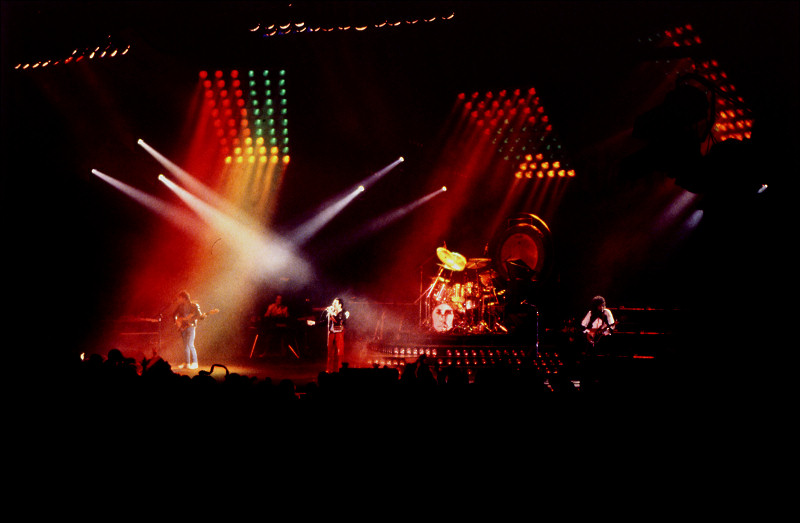
Arena rock
Arena rock (also known as AOR, melodic rock, pomp rock, stadium rock, corporate rock or dad rock[1][nb 1]) is a style of rock music that became mainstream in the 1970s. It typically involves radio-friendly rock music that was designed to be played for large audiences.
"Dad rock" and "stadium rock" redirect here. For the radio format associated with the baby boomer demographic, see Classic rock. For the 1985 Alexander Gradsky rock opera, see Stadium (rock opera).Arena rock
- AOR
- melodic rock
- stadium rock
- corporate rock
- pomp rock
- dad rock
1960s to mid-1970s
As hard rock and pop rock became increasingly popular, groups began creating material inherently designed for performance to crowds and major concerts. Arena rock also developed from their use of more commercially oriented sounds that were intended for radio play. The highly produced music, including both upbeat, dramatic songs and slower power ballads, features strong emphasis on melody and frequently employs anthemic choruses.[3] Other major characteristics include prominent guitar effects and the use of keyboard instruments.[4][5][6] Typical themes of arena rock lyrics include love, heartbreak, angst, and sentimentality.[7]
Many of the above labels are used pejoratively,[4][8][6] and discussions over music criticism often delve into the question of whether musicians' focus on rock spectacle and mass appeal results in compromised artistic merit, particularly in terms of the difference between the interests of the "middlebrow" populace versus other listeners.[4][8] Interest in arena rock is stereotypically associated with working-class to middle-class men living in either Canada or the United States (including so-called "yuppies"),[4][5] which has been cited as the basis for condescending prejudice over social status in some criticisms.[4] However, the style of music has been highly successful worldwide, particularly in terms of touring.[3][4][5]
Critical perspectives[edit]
Ethnomusicologist Chris McDonald of Cape Breton University has argued that the label of a musical artist as "arena rock" and "old wave", done by music critics dismissively, originates from a background of classism influenced by modernism. Thus, mass popularity is put forth as an argument against perceived artistic merit, through the eyes of critics focused on high culture while disdaining market forces, particularly given the white, working class to middle class makeup of the fans. Focusing on the Canadian trio Rush, McDonald stated that the panning of the group as "dazzling yet empty" due to the musicians' focus on rock spectacle is a consequence of critics' psychological distance from the "middlebrow" populace that listens to them.[4]
The use of commercial sponsorship for the large-scale tours and concerts of the 1970s, a practice that continues, has caused the music to pick up the pejorative label of being "corporate rock".[23][8][6] Writer Chris Smith argued that the style dehumanized listeners, setting them up as passive recipients rather than allowing them to truly engage with musicians, and additionally put different bands in a position akin to homogenized products.[8] It has also been regarded as essentially malign capitalist propaganda.[23] The distance between taste-makers' judgment of certain groups as "uncool" and their mass audience appeal had existed since the style's origins after the ending of the 1960s,[10] and a wide variety of other dismissive terms have been used such as "dad rock".[6]
Deliberately playing against criticism and claiming to represent the people against the elite has been used in musical marketing.[10] The association of arena rock with the so-called "yuppies" and their conspicuous consumption additionally has tied the style with a group often maligned in the media, subject to mocking caricatures and other kinds of ridicule. However, as pointed out by historian Gary A. Donaldson, the music eclipsed the waning genre of disco and related bands successfully toured across the world.[5]